In the summer heat it is pleasant to plunge into the pool. Someone has a pond under the open sky, someone under a canopy or a dome, and someone even occupies a separate apartment in a specially allocated room. Regardless of where you have a swimming pool, you need to take care of it properly, from the first days to the complete conservation. Descent and launch of new water is not enough, to maintain cleanliness and a healthy environment in the pool, you need to use chemicals. What substances need to be purchased, and in what order to use them, will be described below.
Content
Care of the pool
Owners of swimming pools for sure noticed that with active use and in standing water pollution appears. From this, unfortunately, can not escape. In the water are particles of debris, organic compounds such as pollen, even a few grams of sunblock, detached from the skin, can damage the pool. To maintain cleanliness in the pool, it is necessary to disinfect, clean and fertilize the aquatic environment in a timely manner. Despite the fact that the pools are divided into inflatable, frame and stationary, methods of care and prevention are almost the same:
- First, the pool is prepared: inflated, unfolded or simply opened from the canopy;
- Then the basin walls are washed;
- After that, the pool is filled with water;
- The filter-pump is connected;
- After the collection of water, a reservoir is added;
- Now you need to watch the water. With the advent of garbage it is caught and disposed of. Do not forget to look into the filter basket. With the appearance of spots on the walls of the pool, try to get rid of them immediately;
- With proper prevention, pool cleaning will be performed much less often. However, you can not leave this process. After a timely procedure, your pool will "come to life" again;
- If necessary, concentrates can be added to water, aimed at getting rid of harmful bacteria, aligning the acid-alkaline environment;
- For the winter, the pool is preserved.
Cleaning the pool
Most novice owners believe that cleaning the pool is enough to update the water.
First, this method is suitable only for small tanks.
Secondly, every week it will be costly to drain a large volume of water. ,
And thirdly, as with the renovation of water in small reservoirs, and in large ones, you still have to take care of the cleanliness of the walls, and thoroughly wash them with chemicals.
To clean the pool, both at home and in social conditions, choose several ways:
- Use of physical cleansing;
- Application of dry cleaning;
- Application of electrophysical cleaning.
All three methods differ in cleaning specificity, so it is important to know when to apply this or that method. In the first case, physical cleaning is understood as the use of scrapers, brushes, nets, water vacuum cleaners. That is, the means by which you can clean the water surface, the bottom or the walls of the pool. Filters also apply to them. They are installed directly in the pool. They perform automatic work. Conditionally, filters are divided into three types:
- Sand - a budget option, the basis of such a filter is sand. The device must be checked daily for accumulated debris. In case of detection, the box is washed and restarted. As a rule, such filters are not very powerful, they are installed in pools with a small amount of cubature;
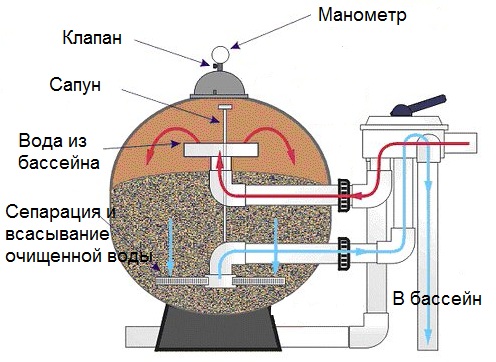
- Cartridge - the filter cartridge is a mesh cartridge. When clogged, it can be easily washed or replaced with a new one;
- Diatomaceous- one of the expensive filters. The device has several cartridges. They are based on diatomaceous earth or ground particles of plankton. Such a base carefully filters the water, freeing it of the smallest debris and bacteria.
In the second method of cleaning - chemical, use powder mixtures and tablets. These include oxygen means, chlorine-containing and bromine-containing. Oxygen pills are an effective modern tool that quickly releases water from bacteria. It costs a little more than drugs with a content of chlorine and bromine. Many owners of swimming pools in the old manner use chlorine. If you do not like the pungent smell of a budgetary chemical, then replace it with a drug that contains bromine. It does not emit unpleasant odors.
Electrophysical method of cleaning for swimming pools is the most expensive. Usually it is used in sports or swimming pools, but for home use, specialized installations are no less popular. Cleaning is automated and does not require the introduction of chemical concentrates in large quantities. Purification occurs under the influence of ultraviolet lamps, ozonizers or devices that emit silver and copper ions.
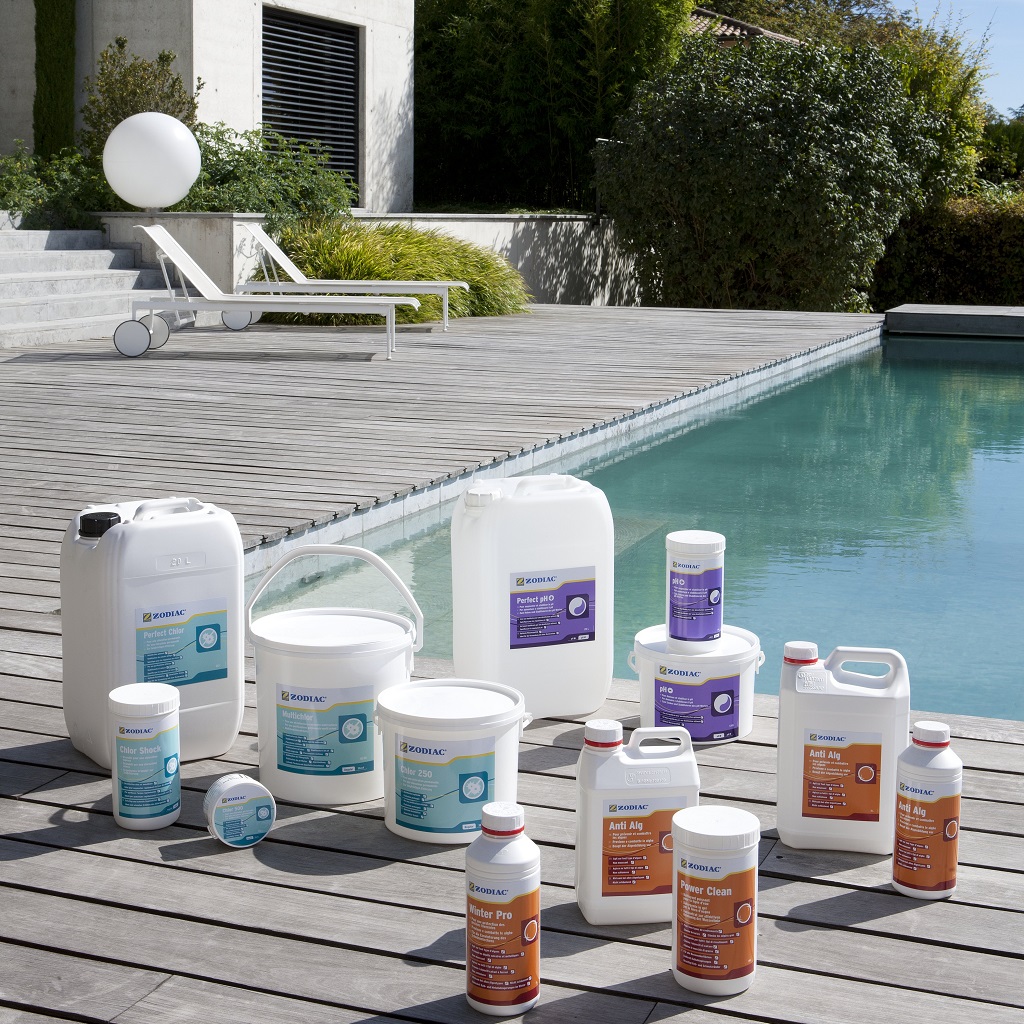
Disinfection of the pool
In addition to mechanical debris, bacteria and algae appear in the pool water. To prevent insidious education, it is necessary to disinfect. There are several of its types:
- Ozonation - ozone is used as a water purifier. It is a powerful oxidizer, which, when ingested, destroys bacterial formations and, as a result, contamination. In this case, all the useful elements in the water are stored. Thus, after treatment, you have an updated water, in which you can again swim. After the ozonation procedure, it has a pleasant odor, and when it gets into the nasopharynx, the liquid is absolutely safe, since it is completely cleared of harmful compounds;
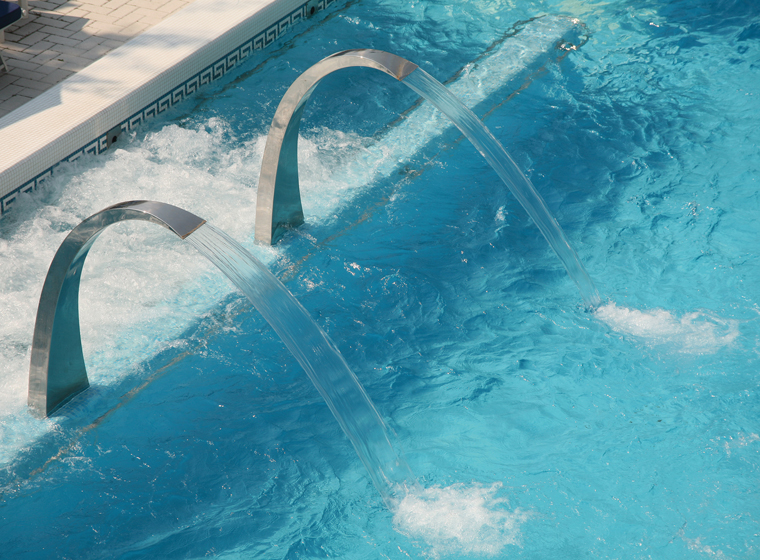
- Irradiation with ultraviolet light - The use of lamps is effective with daily use. The method of disinfection will only work if properly connected by specialists. UV irradiation releases water from bacteria. However, if the water is heavily polluted, the rays will not work;
- Ionization - the disinfecting system works on the ions of non-ferrous metals with direct action of "water-metal" or with ionization guns;
- Chlorination - one of the most accessible ways, which is time-tested. Chlorine can be introduced into the water manually or through special systems. Thanks to the chemical substance, the bacteria die. When using this method of disinfection, do not forget about the normal chlorine content in the pool. If the chlorine content is more than 0.5 mg / l, then the time has come when specialized pool chemistry is introduced which should be used strictly according to the enclosed instructions.
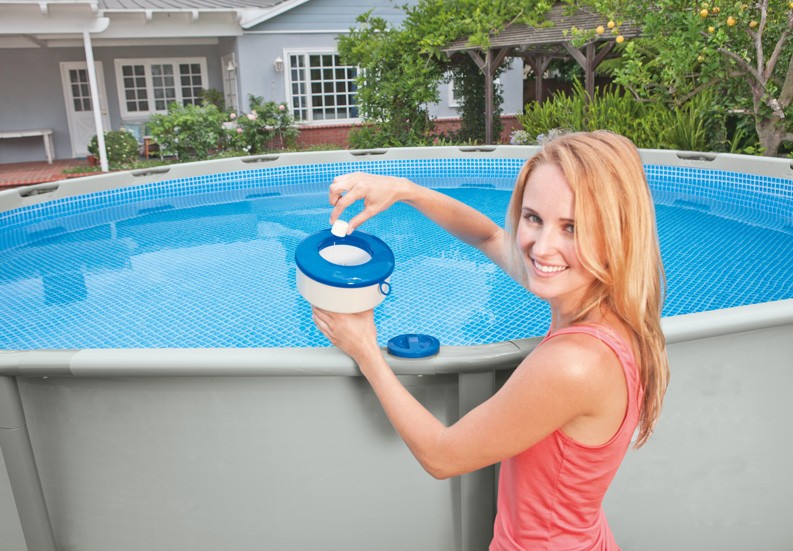
Means for cleaning pools
The very first sign for cleaning the pool is the appearance of an unpleasant smell or a change in the color of the water. And, if everything is clear with the latter, then to determine the causes of extraneous odor, you need to measure the pH level. Most likely, in the water began to appear foreign substances or manifested their lack. For example, in the absence of free chlorine, a pungent smell is formed that cuts and twitches the eyes. If the level of the substance is leveled, the smell will disappear again. For proper care and maintenance, you should have a whole pool cleaning kit.
PH testers
- Photometer Pooltester Bayrol (5 in 1) - an electronic device designed to measure water indicators. The kit for the portable device includes reagents and auxiliary devices. With their help, you can determine the level of free chlorine, alkaline balance, acid level, total chlorine. The photometer gives out the necessary parameters in a few minutes;
- Bayroklar Tester - The kit includes 40 tablets and 2 containers for measuring water values. 20 tablets are designed to measure pH, other 20 pellets are needed to measure Bayroclar;
- Test strips QuickTest - a set of test strips for the determination of pH and active oxygen;
- Photolyzer Digital Photometer - A device with a set of reagents to measure 18 important water indicators. Like chemistry for the pool, you can buy it in a specialized supermarket or when ordering through the Internet.
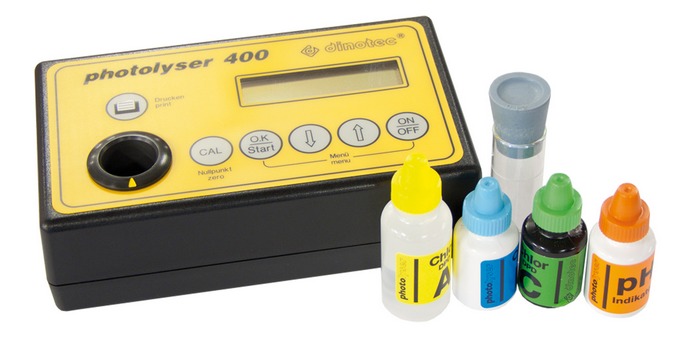
Means for raising and lowering the pH
- pH minus Bayrol - means for lowering the pH;
- pH-plus Bayrol - means for increasing the pH level;
- EQUI-MINUS - a drug that is on sale in liquid and granular form. Allows you to reduce the acid and alkaline balance in the aquatic environment. Granules are packaged in bags for convenient dosage, and the liquid preparation is in a can of 30 liters;
- CTX-10 - granular preparation for pH reduction;
- CTX-20 - granular preparation for increasing the pH;
- Dinoplus - Concentrated solution for increasing the pH by manual input or by means of an automatic station.
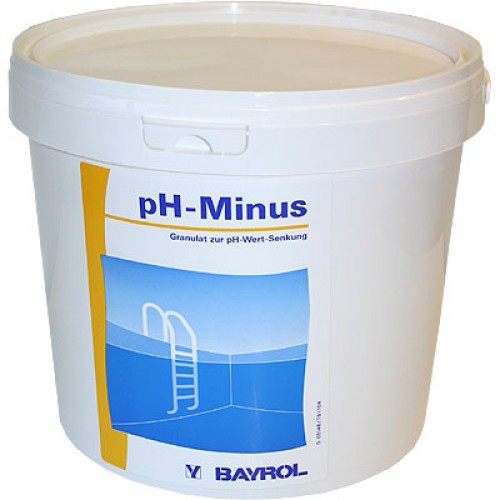
Means against mineral deposits
- Antimineral-CIP - acts in relation to mineral deposits (calcareous deposits, milk stone, rust, beer stone). It is sold in liquid form for 5, 10 and 20 liters;
- Antimineral-Forte - an agent based on acid. Used for swimming pools as a "solvent" of mineral stones, raids, rust. Available in liquid form of different concentrations. Does not have a pungent odor;
- E90 Super - a remedy effective in combating mineral deposits and algae. The composition includes biodegradable substances.
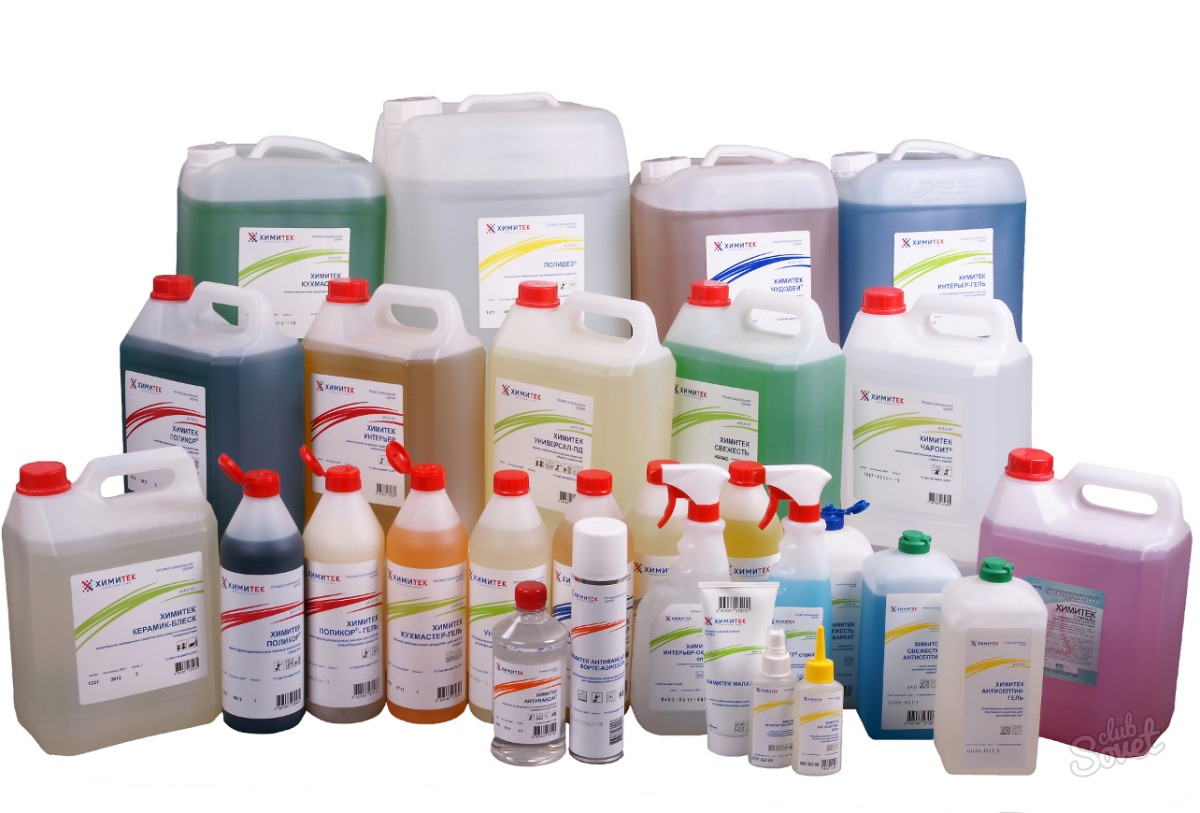
Means for cleaning pools of all types
- Dorang - a product based on sodium hypochlorite. Used in pools for disinfection, removal of salt deposits, calcareous deposits. It is sold in liquid form in canisters of 20, 30 liters;
- Hicanth - active substance calcium hypochlorite. Fighting bacteria and pollution;
- Aqua-Aurat - a preparation for fighting water pollution. The active ingredient is aluminum polyoxychloride. As a result of reaction with water, foam forms. It can be easily removed by physical cleansing;
- Algithin- used in swimming pools to control algae. Even if the water has acquired a green tint, the introduced part of the concentrate will help to brighten the water surface. After using the drug, the pool will be protected from organic damage for a long time, since the active components of the biocidal agent are not susceptible to destruction when sunlight penetrates;
- Cochisote - a means by which you can wash and clean the pool. It dissolves chalky, ferruginous, salt deposits. The composition includes a sparing substance.
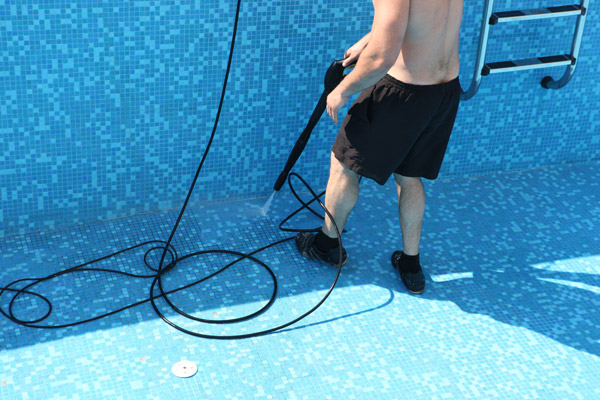
Tips for the care of the pool
- Watch the water surface. As soon as you notice the hit of leaves, branches, paper and other things, take it out with a net. Keep it ready and do not let any garbage enter;
- Weekly (at least) measure the level of chlorine and pH. This will prevent the turbidity of water and timely adjust the water balance without harm to the human body;
- Clean the pool in good time. Do not forget to change the filter cartridges. Use chemicals and tools. This will save time and money;
- If you do not plan to use the pool for a while (for example, in case of departure), cover it with a protective cover. This will protect the tank from getting debris;
- For the winter, you do not need to drain water from a stationary outdoor pool. The filled pool can be preserved until the onset of spring;
- Some expensive means can be replaced by more budgetary ones. For example, preparations containing the active substance sodium bicarbonate can be replaced with ordinary baking soda. And the dosage will be the same as that of an expensive drug;
- If you notice greasy spots on the water surface (they may appear from the use of body lotions, tanning creams), just throw a regular tennis ball or a couple into the pool. Fibrous surface absorbs insidious pollution and purifies water;
- Do not forget to clean the area around the pool, including stairs, handles, holders. This will also preserve the required view of your pool.
Perhaps, this is all you need to know about the care of the pool. If you have any questions about the content of water systems, ask for help from a specialist. They will help you conduct timely prevention and eliminate the impending problem.



















